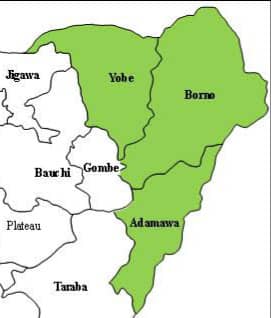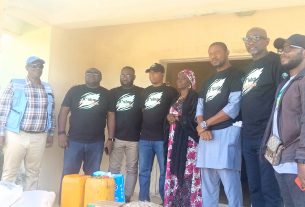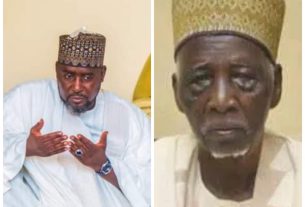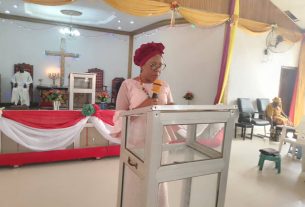The states of Borno, Adamawa and Yobe, otherwise known as BAY states after the initials of the three insurgency-harassed states, battle more than other states with what has become infamously termed brain drain common to all of Nigeria.
The BAY states suffer more after the extensive damage done by Boko Haram who have in their numerous attacks killed some health workers, abducted some others who never returned, and scared yet some others from the states.
A similar fate befalls material resources in the hospitals across the three states. Many of the hospitals and other health institutions were attacked over the past many years of Boko Haram incursions, leaving such places decapitated in structures, in machines, and in other facilities.
The result is the complaint now of scarcity of equipment and human resources in the BAY states.
These complaints were voiced earlier in the week by the health commissioners of the three states when they met in the Adamawa State capital, Yola, at a review meeting called by the World Health Organisation (WHO).
WHO which has done much these past years to mitigate the effects of insurgency in the three worst affected states, arranged its health intervention review meeting attended by representatives of the governments of the three states as well as officials of WHO, led by its Country Representative, Dr. Walter Mulombo.
During the 13th Joint Review of Humanitarian Response in the BAY states which lasted in Yola from Monday November 27 to Wednesday November 29, the three commissioners of health of the BAY states were synonymous with complaint about rising cost of hospital equipment.
They said the issue with equipment had complicated the older matter with brain drain and that these were huge challenges to health care delivery.
The Borno State Commissioner of Health, Prof Baba Malam Gana, said during an interaction with newsmen in the course of the review meeting, “Borno State as the epicentre of Boko Haram attacks lost 50 percent of its health institutions. It means that a lot of our staff have been displaced. Some were abducted, some were killed, and the situation in the health system generally was very dare.
On the shortfall of human resources, the commissioner said, “We have serious challenge of staff.”
He was quick, however to add that the Borno State Government was working hard to remedy the situation.
He said Governor Babangana Umaru Zulum had for instance approved 30 percent salary increase to health workers willing to work in rural areas.
“Furthermore, the College of Nursing and Midwivery in Maiduguri which used to have about a hundred students per year has been expanded to produce 400 a year,” he disclosed, adding that the government is building two schools of nursing and midwifery: one in Goza, another one in Monguno.
“Above all, the governor is building a tertiary institution, the Borno State University Teaching Hospital and Medical School, and already students have applied to start reading medicine and dentistry,” the commissioner said.
He said the state would in no long time heave a sigh of relief over its health sector.
According to him, this would be more so because WHO has helped Borno State in many respects, such as in times of emergency, such as diphteria outbresk, such as cholera outbreak.
“WHO has been with us since the beginning of insurgency. WHO understands the unique situation in Borno State, with particular reference to depletion of health care resources,” he said.
His Adamawa State counterpart, Dr Felix Tangwami said the issue of equipment is an increasingly worrisome one.
Dr Tangwami said hospital equipment and facilities were becoming costlier than the structure itself.
“We are resorting now to updating software instead of buying new machines,” he added.
Talking about human resources, the Adamawa health commissioner said, “We have said often that human resources and equipment are our greatest challenges. Even at the National Council on Health, everyone is talking about human resources. You train people and they are taken away.”
On how WHO has mitigated what might have been severe challenges, the Adamawa State Commissioner of Health said, “Surveillance of WHO has been superb. In every outbreak like cholera and even the diphteria issue, they have been in the forefront ensuring that the diseases are detected and attacked before they spread.”
He added that WHO had also been most helpful with capacity building, explaining, “They train health and social workers especially in respect of new or unusual health challenges that we have had, such as during the covid-19 era.”
Dr Tangwami said the review meeting in Yola was vital because “the top WHO officials are here to hear our challenges first hand.”
Dr Babagana Abba who represented the Yobe State health commissioner and expressed same frustration with inadequacy of material and staff, said WHO had been supportive with capacity building of available staff.
The Yobe State Government representative said WHO had continually helped with reaching out to hard-to-reach communities with health services, intervened in times of health emergencies as well as routine immunizations.
In the course of their presentations, all the commissioners expressed gratitude to WHO for its numerous interventions. They nonetheless canvassed more help, mentioning areas where such help was most needful.
In his address, the WHO Country Representative, Dr Walter Mulombo assured that the organisation would continue to work with the various governments towards making life healthier for Nigerians.
The WHO country representative explained that the Joint Review of Humanitarian Response in the BAY states is a regular meeting that reviews the interventions in the states.
Trending News further reports that the Northeast 13th WHO End-Term Joint Operation Review (JOR) meeting in Yola, November 27th to 29th, was an annual review of the operations in health emergencies and humanitarian response of the BAY States.
It included review of key achievements, key health priorities and challenges based on the previous year humanitarian and emergency plans for the three states.
By Onimisi Alao




